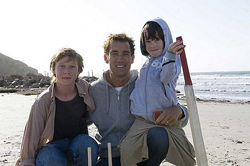Grief is a fickle and demanding companion. And it can inspire really lame movies that cheapen our very understanding of grief, or it can inspire movies that richly explore the complicated relationship between fickle, demanding grief and frail yet resilient human beings. Thankfully, The Boys Are Back is a lovely example of the latter.
Inspired by Simon Carr’s 2001 memoir, The Boys Are Back in Town, this film tells the story of witty, on-the-go sportswriter Joe Warr (Clive Owen) and the way grief shapes him and his two boys. Due to divorce and remarriage, Joe has sons on two continents—his homeland of England and his current home in the beautiful Australian countryside. Though he loves both boys, Joe rarely sees either due to his constant work travels.
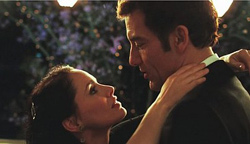
Days after returning from another trip, his world is rocked when his wife Katy (Laura Fraser) collapses in the middle of a cocktail party. It’s an aggressive cancer that steals her away within weeks. Joe is left to help their six-year-old son, Artie (Nicholas McAnulty), who doesn’t quite grasp the gravity of the situation, navigate this loss even as Joe struggles to do so himself.
Despite protests from his play-it-safe mother-in-law (Julia Blake), Joe decides a road trip is in order. He needs to escape—and get better acquainted with his son. So he packs up Artie and Artie’s favorite stuffed monkey in their Range Rover and drives to a succession of lonely hotel rooms, trying to evade the grief that follows them like a dark shadow.
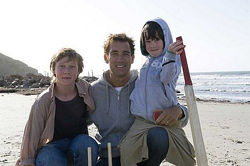
Both on the road and back at home, Joe gets better acquainted with single fatherhood—the constancy of dirty dishes and dirty clothes (which he largely ignores) and the non-stop energy of a precocious six-year-old (which feels like a life-giving balm in the midst of death and grief). So Joe embraces this wild-child approach to life, participating in in-house water balloon fights and late-night games of flashlight tag.
And just when Joe and Artie are falling into a new, almost feral existence, Joe’s other son, angsty teen Harry (George MacKay), comes for a visit. Harry brings an intriguing and unexpected plotline to the mix, as he questions his father about why he left his first family for the new one he created so far away. Despite this angst, Harry joins in the fray, until all the trio’s emotions—grief, abandonment, fear, love, anger—finally come bubbling to the surface.
Though this might all sound heavy and depressing, it’s really not. When tough emotions are portrayed honestly—instead of sanitized (see Love Happens for a recent example) or manipulated for most gut-wrenching effect (see Legends of the Fall for a classic example)—it’s gratifying. We’ve all experienced staggering loss or other difficult situations, so we know honest grief from the imitators. This is the real deal. In all its messy, sometimes funny, transcendent, healing reality.
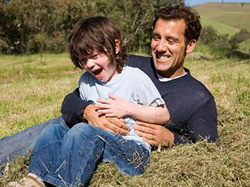
The fact that this portrayal is also engaging and entertaining is a huge credit to the original material by Simon Carr, the great screenplay by Allan Cubitt, and also to the wonderful acting. Clive Owen gives an award-worthy performance here, emotionally fraught but never overdone. He offers so many emotions—grief, child-like joy, anger, remorse, cluelessness, affection, awakening. All are believable, and so enjoyable to watch. And how intriguing to see male characters navigate these emotions on film and not get all embarrassed by the display—or lapse into crude bro-mance humor to make up for it.
Six-year-old Nicholas McAnulty makes an impressive feature film debut. His angry, wordless tantrum in the car in one scene just breaks your heart. Then he’s all boyish danger and glee as he zip-lines from a tree in their front yard. Let’s hope he finds more complex childhood roles to enchant us with in the future.
The cinematography is sumptuous. Shot in the South Australian countryside, The Boys Are Back‘s far-flung emotions are mirrored in the beautiful rolling hills lined with dry, dusty roads. And the sea provides both play and perspective, as our boys frolic in and contemplate alongside it in various scenes.
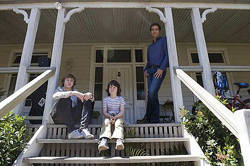
The realistic messiness inside offers a needed contrast to the grandeur outside. Joe’s “just say yes” approach to life takes its toll on the house. And though it’s a lovely structure, it feels very lived in. The hotels Joe and Artie visit, Artie’s classroom, and a single mom-friend’s house all seem realistic—again, not the typical Hollywood sheen.
It’s not just the settings that are believably messy—the people are, too. Joe makes mistakes. He has to confront the consequences of his previous decisions. He’s clueless when interacting with Artie’s classmate’s mom, Laura (Emma Booth). You’ll likely disagree with some of his parenting decisions. But he’s doing the best he can. And trying his best to move himself and his boys forward under devastating circumstances. As he says in a voice-over in the opening scenes of the film, “Life is a journey to be traveled no matter how bad the road.” In the end, The Boys Are Back is a highly satisfying ride.
Talk About It
Discussion starters- Do you think Joe was wise or unwise to go on the road trip with Artie after Katy’s death? What were the benefits and/or drawbacks of that trip?
- Talk about how the different characters—Joe, Artie, Katy’s mom—deal with Katy’s death. How have you dealt with significant loss in your life? How has that coping been effective or ineffective?
- What do you think about Joe’s parenting choices and style in the wake of his wife’s death? Is “just say yes” a good approach to parenting? To life?
- Do you think Katy’s mom is wise to question Joe’s parenting? Or is she being too strict and perhaps stifling them?
- In what ways do the three male characters grow and change during the course of the film? Where do you see these guys in five years?
The Family Corner
For parents to considerThe Boys Are Back is rated PG-13 for some sexual language (mainly in a humorous scene in which Joe tells Harry which swear words kids aren’t allowed to use in his home) and for thematic elements of death and grief. After her death, Katy “visits” Joe and they have conversations (it’s understated and not portrayed as a spooky or ghostly thing). Six-year-old Artie sees his mom get really sick and frail and eventually die. Teenaged Harry wrestles with being abandoned by his dad when he was a young boy. Both of the boys’ plotlines could inspire interesting conversations with your kids.
Photos © Miramax Films
Copyright © 2009 Christianity Today. Click for reprint information.


